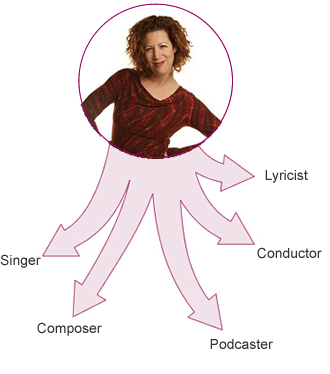Careers In Culture
Music and Sound Recording - What You Need to Do
Career Routes
On this page:
The long and winding road
You've chosen a career path that usually has as many twists and turns as a country lane... and more than a few bumps. Most people in music and sound recording move from department to department within a company, move from company to company, or move in and out of various freelance jobs as work becomes available.
You're interested in a career in music and sound recording. Perhaps you'd like to be a rap singer. Or maybe you want to be a composer. Perhaps you want to work in an orchestra or jazz ensemble. Maybe you love computers and want to get into sound synthesis or develop a podcast. Read on to learn more about how to achieve your career goals.

People come to music and sound recording with a variety of educational backgrounds, and their career routes are often unique depending on the type of work they do and the opportunities they find. Anyone considering a job in this field should know about the five musts: education, communication skills, computer skills, networking and experience.
Make the Grade
While your high school diploma is a good start toward your career in music and sound recording, it won’t be enough to find work. Without a good education, what are your chances of surviving and thriving in the music business? Most employers are looking for people with college/cégep diplomas and university degrees, especially in administration, business and technical work. Even if you're on the creative or interpretive side of the business, a diploma or degree will certainly help, particularly if you add marketing, computer and business subjects.
Make a Statement
Whether you're a performer playing a live concert or discussing your ideas with a music journalist, a music teacher explaining a concept to a student or a sound engineer describing a particular sound to a session player, this business is all about communication. Verbal and written communication skills are essential to anyone considering a career in music and sound recording. Do you speak other languages? Can you do website design? With the rapid globalization of music, you could be valuable to a company that is expanding into new markets. Can you write a solid business plan and develop a persuasive grant application? These skills will be valued in any sound recording position and will open doors for you.
Hone Computer Skills
No matter what kind of career in music you are interested in, computers have become an essential tool. Musicians benefit from computerized accounting skills to track their earnings and expenses. Labels and concert promoters rely on the Internet – for example, e-mail, browsing, web design and e-commerce – to market and promote their events and products. Independent artists and labels use sophisticated electronic tools to sell their works directly to consumers around the world. Improve your employability by increasing your computer skills whenever you have a chance.

Build Your Network
The statement “it's not just what you know but who you know” certainly applies to the music and sound recording industry. It's a “people” business where developing a network of contacts is essential. Go to trade shows, attend seminars and music festivals, and join local/provincial/national music associations. Time sitting at home waiting for a call could be used to “mix and mingle” at CD release parties, local jam sessions, and music events such as Canadian Music Week. Keep contact information on the people you meet and send a thank-you note when someone provides you with a useful lead.
Hands-on experience
Experience will always give you an edge in finding and getting work. Use the following exercise to see how you can expand your practical skills and gain valuable contacts.
Career Audiences
 |
I'm a student, and I could...
|
 |
If I'm an artist/worker in transition, I could...
|
Your education can take you places
There are successful musicians, engineers and executives with limited education who went to the “school of hard knocks” and learned on the job. Chances are there was no formal training available when they were young. Today, if you want to succeed, you can choose from many college/cégep and university programs as well as specialized training through workshops and seminars. Your education will give you an edge. Here are some of the paths you might take to your music career:
Learning Paths

- Composer
- Lyricist
- Musician
- Producer
- Singer
- Songwriter
- Accompanist
- Composer
- Conductor
- Orchestra/chamber musician
- Soloist
- Booking agent
- Music publicist
- Orchestra operations manager
- Orchestra tour manager
- Personal manager
- Artist manager
- Festival organizer
- Fund-raiser
- Performing rights administrator
- Record label manager
- Composer / theorist
- Copyist / arranger
- Musicologist
- Orchestrator
- Stage manager
- Studio musician
- Film composer
- Music therapist
- Public school music teacher
- Private music teacher
- Accountant
- Concert promoter
- Publicist / press agent
- Record label manager
- Record company marketing representative
- Record company promotion representative
- Record company sales representative
- Record store manager
- Music columnist / critic
- Music journalist
- Publicist
- Copyright / trademark lawyer
- Entertainment lawyer
- Record label manager
- Instrument designer
- Producer
- Recording engineer
- Resident sound technician
- Sound reinforcement engineer
- Technical sales person
- Film sound designer
- Video game composer
- Web designer
- Webmaster
Want to learn more about education programs and schools? Talk to:
- Respected music professionals in your area.
- The professional organizations listed on this website.
- Arts organizations in your community.
- A local librarian.